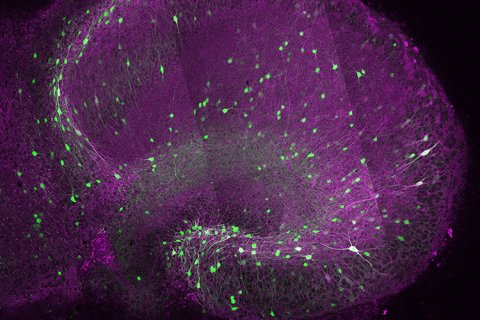How brain cells hit the brakes
Researchers discover how cannabis-like substances keep the brain in balance
Whenever we learn, remember or forget something, a surprisingly active role is played by cannabis-like substances in the brain. Researchers at Utrecht University found that the substances actively balance connections in the brain that allow cells to either activate or inhibit each other. The discovery reveals how brain cells influence each other, and how psychiatric disorders can arise when this process goes wrong.
Although wisdom comes with age, our brain does not store every single experience or lesson learned. In addition to learning and remembering, our brains are also equipped to forget irrelevant things or drop unused skills. In order to find a balance in this, brain cells constantly communicate with each other through connections that activate or inhibit the cells. Researchers from Utrecht University discovered that brain cells can form new, inhibitory connections via so-called endocannabinoids. They announce their discovery in Journal of Neuroscience.
Counterbalance
Endocannabinoids derive their name from the cannabis plant, which contains similar substances. The researchers discovered the role of endocannabinoids when they induced brain cells of mice to strengthen activating connections. In response, the brain cells also started making new inhibitory connections. The researchers found that endocannabinoids kickstarted the new connections.

Surprisingly active role
The researchers were surprised to find that these substances play such an active role. "Nobody expected this from endocannabinoids," says research leader Corette Wierenga, neurobiologist at Utrecht University.
It was already known that endocannabinoids can influence the functioning of our brains. But until now researchers assumed that the substances were merely involved in adjusting existing connections. "Now it appears that the system of endocannabinoids can actively push the production of new inhibitory connections, with which brain cells actively regulate the balance."
Psychiatric disorders caused by imbalance
The discovery could help scientists to better understand how psychiatric disorders and other abnormalities in the brain develop. In many of these disorders, the balance between inhibitory and activating connections is disturbed. During an epileptic seizure, for example, this balance is seriously disturbed. Although in many other disorders the disturbance is more subtle, for example in schizophrenia, the impact can still be equally profound.
Unbalance caused by cannabis
The balance between activating and inhibiting connections in our brain is constantly being adjusted in response to our experiences. Whenever we experience something, the connections change, and the brain must restore the balance. Cannabis use can disrupt that balance.
"Occasional cannabis use will not seriously disturb the balance," says Wierenga. "But if the balance is disturbed for a longer period, it can cause problems. For example, children of mothers who smoked marijuana during pregnancy can experience problems with neurological development."
Early stages of life
The balance is especially important in early stages of life, Wierenga says. "During our development, brain connections are constantly changing. Especially during that period, it is important that inhibitory and activating connections remain coordinated. If the coordination is malfunctioning or disturbed, you can imagine that the system becomes disrupted. And unfortunately, disruptions that occur so early cannot be easily repaired later in life."
Things get out of hand more easily in the brain, when inhibition and activation are out of balance
According to Wierenga, such disruptions can lead not only to loss of memory, but also initiate more serious consequences. For example, the brain might grow out to less adaptive to stressful situations. "When this happens, things get out of hand more easily in the brain, because inhibition and activation are out of balance. That could lead to learning and behavioural problems."
Predicting and preventing disorders
Creating a deeper understanding of the role endocannabinoids play in the brain, could lead to psychiatric disorders being more predictable or even prevented in the future. The publication in Journal of Neuroscience now sets out a new direction in which more knowledge can be built up. Wierenga: "Ultimately, as a researcher, we want to understand how brain cells coordinate the balance and what happens when that balance is disturbed.
Publication
Axonal CB1 Receptors Mediate Inhibitory Bouton Formation via cAMP Increase and PKA
Journal of Neuroscience, September 2021. DOI: 10.1101/2021.04.12.439503
Jian Liang, Dennis L. H. Kruijssen, Aniek C. J. Verschuuren, Bas J. B. Voesenek, Feline F. W. Benavides, Maria Sáez Gonzalez, Marvin Ruiter, Corette J. Wierenga

